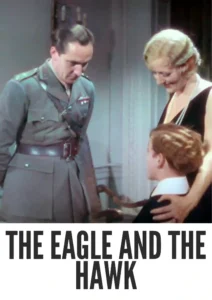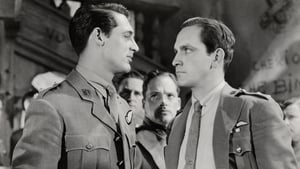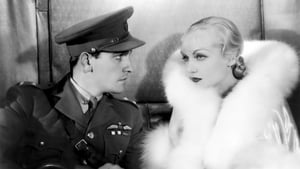Contact: info@alwanfilm.com
Video Sources 0 Views
- Watch trailer
- The Eagle and the Hawk


Synopsis
Table of Contents
ToggleReview: The Eagle and the Hawk 1933 Colorized – A Poignant War Drama Soaring with Emotional Depth

Introduction
“The Eagle and the Hawk” (1933) takes flight as a compelling exploration of the human cost of war and the toll it exacts on the souls of those who fight. In this review, we will delve into the significance of this early cinematic gem, examining its portrayal of the harrowing realities of aerial combat and its enduring impact on audiences.
Check The Full Colorized Movies List
Check Our Colorized Movies Trailer Channel
Understanding The Eagle and the Hawk 1933 Colorized: Director, Cast, and Genre
Directed by Stuart Walker, “The Eagle and the Hawk” (1933) showcases his ability to craft nuanced narratives that resonate with audiences on a deep emotional level. The film boasts a talented cast, including Fredric March, Cary Grant, and Carole Lombard, whose powerful performances bring the characters to life with authenticity and depth. Blending elements of war drama, tragedy, and psychological thriller, “The Eagle and the Hawk” (1933) offers a gripping exploration of the human psyche in the crucible of war.
Exploring the World of The Eagle and the Hawk 1933 Colorized: Plot and Characters
Set against the backdrop of World War I, “The Eagle and the Hawk” (1933) follows the harrowing journey of a group of American aviators who grapple with the moral complexities of aerial combat. As they confront the brutal realities of war and the toll it takes on their sanity and humanity, they are forced to confront their own inner demons and the bonds of brotherhood that bind them together. Through its richly drawn characters and taut storytelling, the film offers a haunting glimpse into the dark heart of war and the resilience of the human spirit.
The Art of Film Colorization
While “The Eagle and the Hawk” (1933) was originally filmed in black and white, the decision to release it in a colorized format offers viewers a fresh perspective on its timeless tale of sacrifice and redemption. By adding vibrant hues to its stark imagery, colorization enhances the film’s visual impact and immerses audiences in the visceral intensity of aerial combat. Through the use of modern digital techniques, colorization breathes new life into classic movies, allowing viewers to experience them in a whole new light.
Early Colored Films: A Brief History
The history of colored films traces its origins to the early days of cinema, with filmmakers experimenting with various techniques to add color to their creations. From hand-painted frames to early Technicolor processes, the evolution of colored film has been marked by innovation and creativity. As technology has advanced, so too has the art of colorization, with modern digital techniques offering filmmakers unprecedented control over the color palette of their films.
The Eagle and the Hawk 1933 and Its Early Colored Version
The decision to release “The Eagle and the Hawk” (1933) in a colorized format opens up new avenues for appreciation, allowing audiences to experience its visceral drama and breathtaking aerial sequences in vivid detail. While some purists may argue that colorization detracts from the film’s original aesthetic, others see it as an opportunity to breathe new life into a classic tale and introduce it to a new generation of viewers. Regardless of one’s stance on the issue, there’s no denying the impact of “The Eagle and the Hawk” (1933) as a powerful meditation on the human cost of war and the enduring bonds of friendship.
The Debate Over Film Colorization
The debate over film colorization is a contentious issue that continues to divide audiences and critics alike. While some argue that colorization compromises the artistic integrity of classic films and alters the director’s original vision, others see it as a valuable tool for revitalizing old movies and making them more accessible to modern audiences. As the debate rages on, filmmakers and audiences alike are left to ponder the merits and drawbacks of colorization in the ever-evolving landscape of cinema.
Examining The Eagle and the Hawk 1933 as an Early Colored Film
As with any colorized classic, the impact of colorization on “The Eagle and the Hawk” (1933) is a matter of personal interpretation. Some may argue that it enhances the film’s visual appeal and immerses viewers in its world, while others may feel that it detracts from the stark beauty of the original black and white version. Regardless of one’s stance on the issue, there’s no denying the enduring power of “The Eagle and the Hawk” (1933) as a timeless war drama that continues to captivate audiences with its emotional depth and gripping storytelling.
Influence and Legacy: The Eagle and the Hawk 1933 Colorized’s Impact on Cinema
“The Eagle and the Hawk” (1933) has left an indelible mark on the world of cinema, inspiring countless filmmakers and captivating audiences with its timeless tale of sacrifice and redemption. From its unforgettable performances to its breathtaking aerial sequences, the film continues to resonate with viewers of all ages, reaffirming its status as a classic of the war drama genre.
Director’s Cinematic Legacy: Beyond The Eagle and the Hawk 1933 Colorized
Stuart Walker’s influence extends far beyond “The Eagle and the Hawk” (1933), with a diverse body of work that continues to captivate audiences around the globe. From his early days as a director of silent films to his later work in Hollywood’s Golden Age, Walker’s films are celebrated for their emotional depth, compelling characters, and thought-provoking themes. Through his groundbreaking work, Walker has left an indelible imprint on the world of cinema, inspiring generations of filmmakers to follow in his footsteps.
Themes Explored in The Eagle and the Hawk 1933 Colorized
“The Eagle and the Hawk” (1933) explores a myriad of themes, from the horrors of war to the resilience of the human spirit in the face of adversity. Through its richly drawn characters and powerful storytelling, the film invites viewers to ponder the complexities of human nature and the moral dilemmas inherent in armed conflict. As audiences immerse themselves in the world of “The Eagle and the Hawk” (1933), they are reminded of the enduring truths that bind us together as human beings and the indomitable spirit that resides within each of us.
Reception and Controversy Surrounding The Eagle and the Hawk 1933 Colorized
Upon its release, “The Eagle and the Hawk” (1933) received widespread critical acclaim, with many praising its powerful performances, gripping storytelling, and breathtaking aerial sequences. However, the decision to release the film in a colorized format sparked debate among purists, reigniting the age-old discussion surrounding film preservation and artistic integrity. Despite the controversy, “The Eagle and the Hawk” (1933) remains a beloved classic that continues to resonate with audiences of all ages, reaffirming its status as a timeless masterpiece of the war drama genre.
Where to Watch The Eagle and the Hawk 1933 Colorized Online
For those eager to experience the timeless magic of “The Eagle and the Hawk” (1933), the film is readily available on popular streaming platforms such as Netflix, Amazon Prime, and Hulu. Whether you choose to watch it in its original black and white format or the early colored version, “The Eagle and the Hawk” (1933) promises to transport you to a world of bravery, sacrifice, and redemption, where the human spirit soars to new heights in the face of adversity.
FAQs About The Eagle and the Hawk 1933 Colorized
Q: Is “The Eagle and the Hawk” (1933) based on a true story? A: No, “The Eagle and the Hawk” (1933) is a fictional tale crafted by screenwriter Seton I. Miller, inspired by the experiences of World War I pilots and the psychological toll of aerial combat.
Q: Who are the main actors in “The Eagle and the Hawk” (1933)? A: “The Eagle and the Hawk” (1933) features a talented cast led by Fredric March, Cary Grant, and Carole Lombard, whose powerful performances bring the characters to life with authenticity and depth.
Q: What awards did “The Eagle and the Hawk” (1933) win? A: While “The Eagle and the Hawk” (1933) did not win any major awards, it received critical acclaim for its powerful performances, gripping storytelling, and breathtaking aerial sequences.
Q: Why was “The Eagle and the Hawk” (1933) released in a colorized format? A: The decision to release “The Eagle and the Hawk” (1933) in color was made to introduce the film to a new generation of viewers and enhance its visual appeal for modern audiences. While the choice to colorize the film sparked debate among purists, it ultimately allowed “The Eagle and the Hawk” (1933) to reach a wider audience and ensure its continued relevance in the annals of cinematic history.
Conclusion
“The Eagle and the Hawk” (1933) remains a timeless testament to the human spirit and the enduring power of cinema to capture the essence of the human experience. As we reflect on the film’s legacy, let us celebrate its status as a classic of the war drama genre and a poignant reminder of the sacrifices made by those who serve their country. Whether viewed in its original black and white format or the early colored version, “The Eagle and the Hawk” (1933) continues to captivate audiences with its emotional depth, gripping storytelling, and breathtaking visuals.












